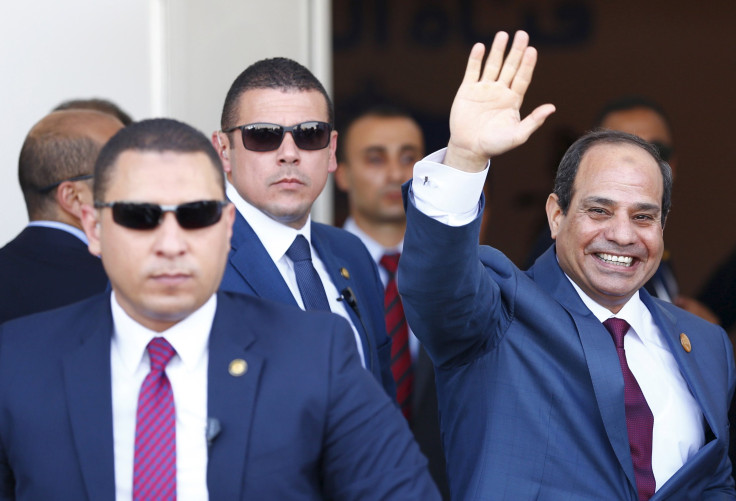Under Egypt President Sisi, Anti-Terrorism Law Allows Crackdown On Suspected Militants

Egyptian President Abdel Fattah el-Sisi approved a strict anti-terrorism law Monday as the country faces a growing insurgency from militant groups and grapples with concerns about security. The law, which would speed up trials and impose harsh sentences for suspected militants -- or those found to be aiding them -- while providing new protections to police officers, has sparked controversy over concerns about its likelihood of violating civil and human rights.
Under one provision of the law, for instance, anyone who does not adhere to official government narratives or statements about attacks or security operations would be subject to a minimum fine of 200,000 pounds, or about $25,000, Al Jazeera reported. That fine was amended from a draft version that initially imposed a prison sentence of two years on those who contradicted official versions of such events. Critics of the law fear that it will harm the media and muzzle government dissenters.
"The law here is a system that is not protecting the citizenry, but rather protecting the state," Dalia Fahmy, a member of the Egyptian Rule of Law Association, told Al Jazeera. "It is becoming indicative of the consolidation of power in the hands of the executive."
The Egyptian government has been battling a growing militant insurgency in the Sinai Peninsula even as it has dealt with popular unrest since the Egyptian military overthrew Egypt's first democratically elected president and a Muslim Brotherhood leader, Mohammed Morsi, in 2013. The government has cracked down on and has blacklisted the Muslim Brotherhood as a terrorist group, but it also faces security threats in other realms.
Turning dissent into "terrorism" http://t.co/yzIAugO9Kc @ShawkanZeid @marcotombesi @farazsanei @Nath67Lic @Ms_Danna @belkiswille @LynnieB65
— IFEX (@IFEX) August 14, 2015In July, Egypt's top prosecutor was killed in a car bomb. At the beginning of that month, a group of militants also carried out a string of coordinated attacks in the northern Sinai Peninsula, killing at least 35 people. The militants were from the Province of Sinai, or Wilayat Sinai, a group that had been known as Ansar Beit al-Maqdis before it pledged allegiance to the Islamic State group in November 2014. Hundreds of Egyptian soldiers and security officers are estimated to have been killed in attacks by the group.
Critics are largely concerned, however, that the law will be used primarily to inhibit dissent and grant the government extreme and broad powers. The legislation is "deeply flawed," the rights group Amnesty International said in a statement, and it "allows the authorities to take extreme measures that would usually only be invoked during a state of emergency, granting the President similar powers to those held during the 30-year-long state of emergency imposed by former ruler Hosni Mubarak."
Under the new law's provisions, suspected militants would be ushered through speedy trials in special courts. Those found guilty could be subject to 10 years of imprisonment, the BBC reported. Those convicted of financing a terrorist group could be imprisoned for life, and if security forces use force when confronting "a real and imminent threat," they are shielded from prosecution.
The law was published in the Egyptian government's official gazette Sunday. It was approved by the Cabinet in July, and the state news service described the law as having been approved "following deadly attacks and armed clashes in North Sinai that left 21 soldiers and 100 militants dead."
© Copyright IBTimes 2024. All rights reserved.






















